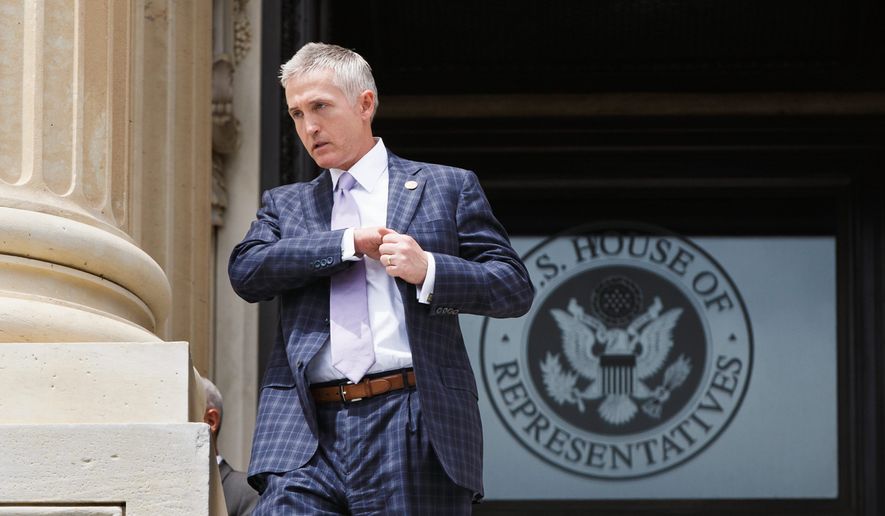Key Republicans will move Monday to try to prevent Libyans from being able to learn to fly airplanes at U.S. flight schools or train as nuclear scientists, introducing legislation to stop the Obama administration from loosening the rules.
At a time when press accounts suggest Islamist militants may have stolen 11 jetliners from the airport in Tripoli last month, the House Republicans say it’s critical to keep a decades-old ban on Libyans being able to train at U.S. schools.
The White House Office of Management and Budget approved the changes last month and they are awaiting a final signature by Homeland Security Secretary Jeh Johnson.
“Is post-revolutionary Libya secure enough to change the rules? Why now?” said Rep. Trey Gowdy of South Carolina, who along with Rep. Jason Chaffetz of Utah and House Judiciary Committee Chairman Robert W. Goodlatte of Virginia, is introducing legislation Monday to cancel the Obama administration changes.
Their bill comes almost two years to the day after U.S. Ambassador J. Christopher Stevens and three other Americans were killed in a terrorist assault on the U.S. diplomatic post in Benghazi, Libya’s second largest city.
The security situation in Libya has been grim since the U.S. provided military power that helped oust former leader Moammar Gadhafi in 2011.
SEE ALSO: Missing Libyan jetliners raise fears of terror attacks on 9/11
The Obama administration says both the State and Defense departments are on board with changing the rules, which currently apply only to Libya but not to some other nations that have spawned terrorists.
Administration officials say Libya has changed since the ban was put in place in 1983, and the U.S. itself has gotten better about weeding dangerous characters out of the pool of visa applicants.
Testifying to Congress earlier this year, Alan Bersin, the Homeland Security Department’s chief diplomatic officer, said the goal was to recruit friendly Libyans who had already been vetted by the U.S. military, and whom the U.S. wanted to help train in key skills.
“Libya is an unstable dangerous and insecure place,” Mr. Bersin testified. “There’s no question about that. That does not mean form the standpoint of the Defense Department, the State Department that we should stand back and not work with those people within the government that we can work with.”
American officials say allowing trusted Libyans to train in the U.S. could help with the country’s efforts to modernize its military and professionalize its troops, which could help the government gain the upper hand on militants.
A call to the Libyan embassy in Washington seeking comment on the proposal went unreturned.
SEE ALSO: Islamist militias from from the Libyan Dawn movement capture Tripoli airport
The administration said relations with Libya have “normalized” in the wake of Gadhafi’s removal, and said most other sanctions have been lifted.
But Mr. Goodlatte said the security situation remains troublesome.
“This summer, Americans working at the U.S. embassy in Tripoli were evacuated due to rival rebel groups battling each other for control of the area. And less than two years ago, the U.S. consulate in Benghazi was attacked by terrorists, leaving four Americans dead,” he said.
Republicans continue to raise questions surrounding the 2012 Benghazi attack and the administration’s response.
The confusion over what happened to nearly a dozen passenger jets last month has added to questions.
The Washington Free Beacon reported last month that the jets had gone missing after Islamic militants captured the airport last month.
Some analysts have disputed the reports, questioning both the veracity of the theft and the likelihood the jetliners could be used in another Sept. 11, 2001-style attack.
• Stephen Dinan can be reached at sdinan@washingtontimes.com.




Please read our comment policy before commenting.